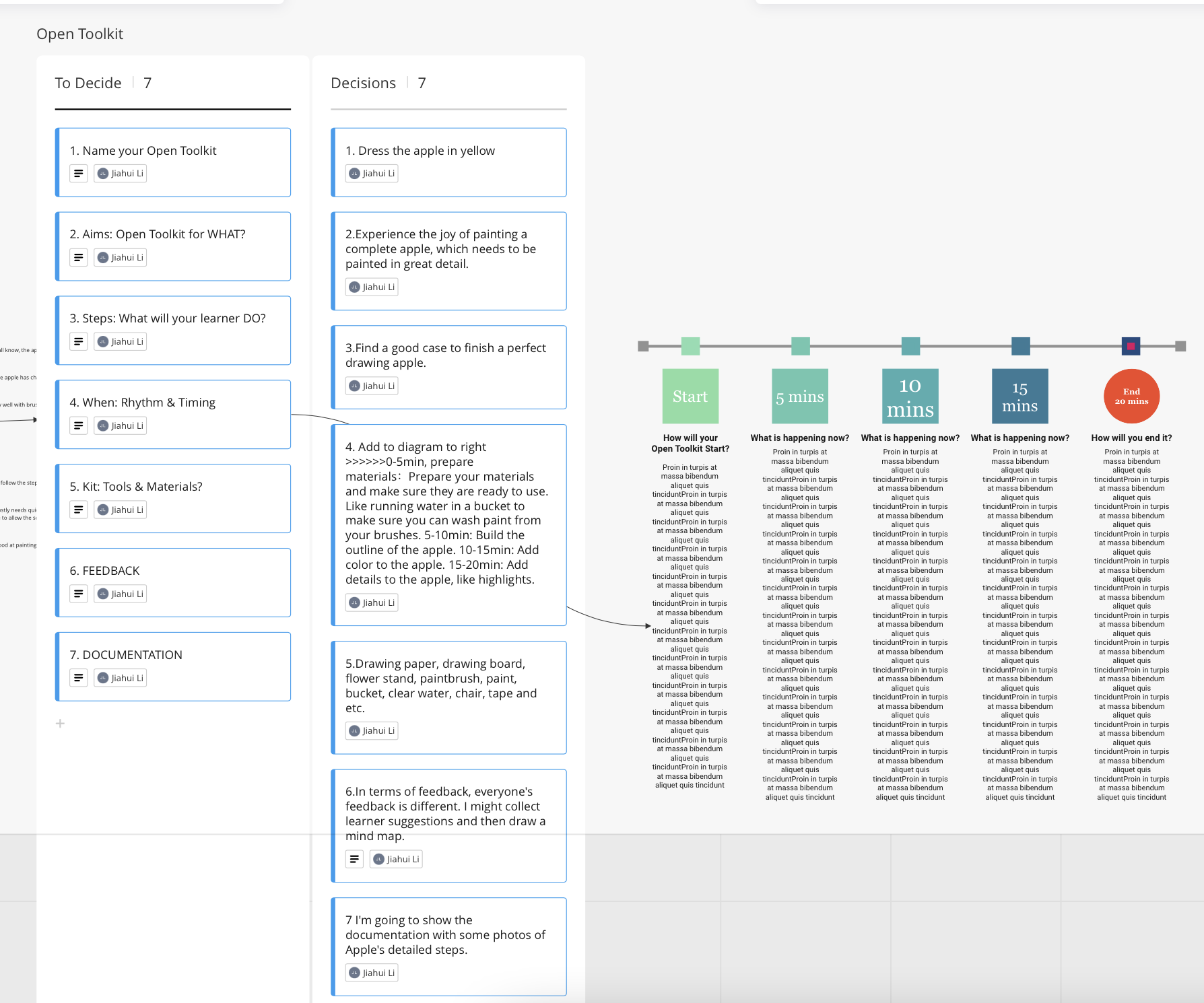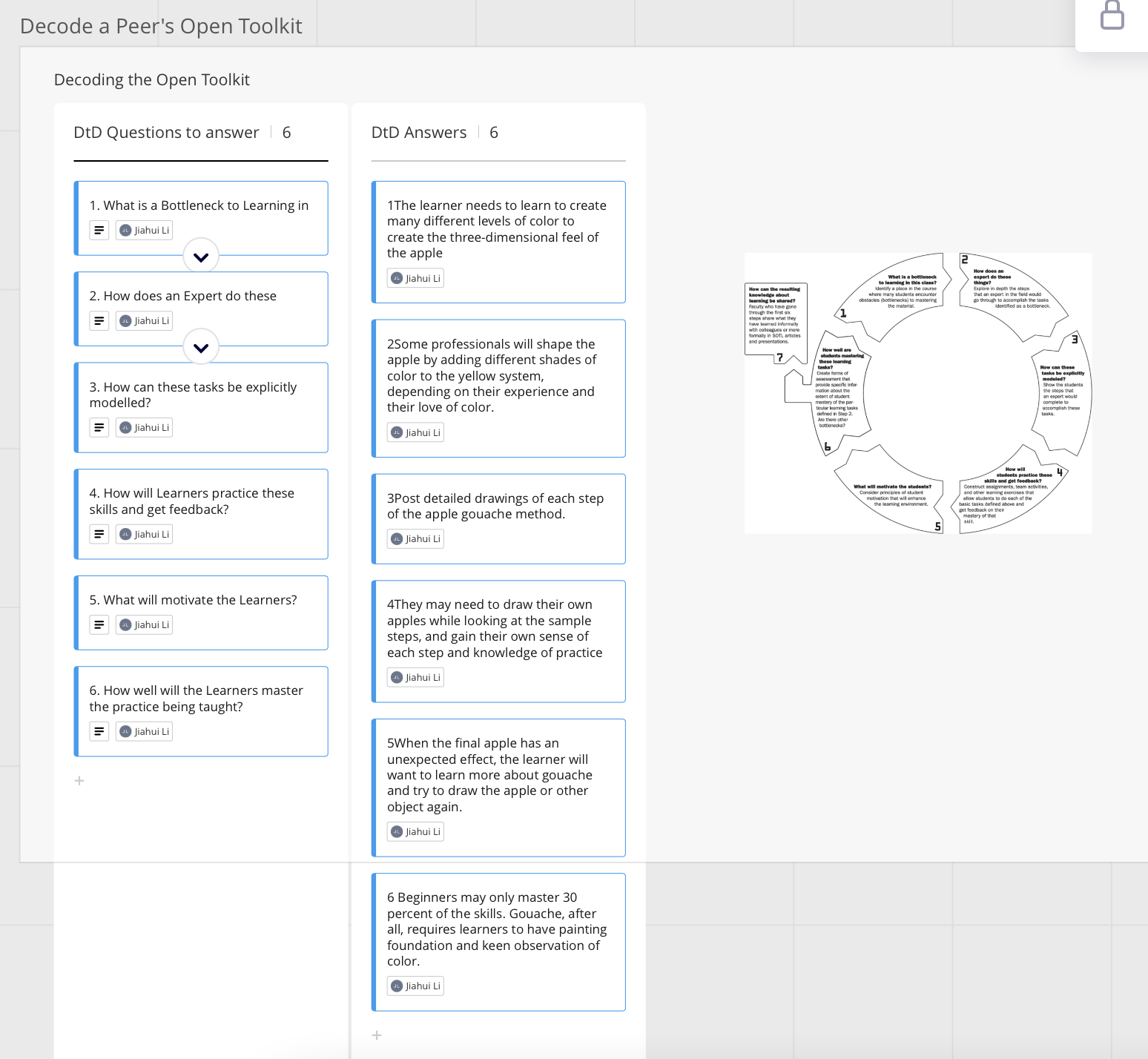“The findings of the study revealed that Gibbs’ reflective cycle is a good framework to be used by the students in writing reflections upon literary works they are working on.” (Adeani, Febriani and Syafryadin, 2020) And after looking at six different patterns, I think Gibbs’ reflective cycle is a relatively easy mode for me to record reflection. Therefore, I will describe my understanding and reflection on the learning in Sprint 3 through Gibbs’ reflective Cycle.
First of all, for sprint3, I decided to prepare toolkit about drawing apples with gouache in the sixth week, and shared my practice with my teammates at the end of the class. I chose gouache apples because I used to be good at gouache apples, which means I’m familiar with all the steps of painting apples with paint. In addition, the apple painting is a relatively easy part of the painting. The structure of the apple is more like a sphere and it’s not as difficult as drawing a human body, so the whole process of this exercise is relatively simple. (Of course, this also requires the learner to have a basic understanding of the structure of the apple, or to use their imagination)
This video is on the steps of using gouache to paint yellow apples
Secondly, the experience of this practice. At the beginning, I was a little confused, although through reading, I learned that SECI includes four elements: Socialization, Externalization, Internalization and Combination. However, I did not fully understand the example explaining the four elements of SECI model in handbook. This example is about Tanaka intern with professional bakers at Osaka international hotel. Unfortunately, after reading this example, I still don’t understand what socialization is. But luckily Neil used the bicycle as an example to help me understand the SECI model. (Thanks Neil) Dubberly and Evenson (2011)realize that Socialization represents recessive to recessive, which is the process of converting the experience gained in daily social interactions into new recessive knowledge. The process of riding a bike is actually a process of transferring experience into daily life, which reflects sociality, especially when riding a bike with friends.
Thirdly, a reflection on evaluation. The biggest lesson I learned in these two weeks was to ask questions. If you don’t know something, ask a professional! For example, in week 7, I asked Jake about documention and he was patient and gave me a lot of good advice. (Thanks Jake)
The fourth part analyzes the practice of this time. The good part is that I have a good understanding of the process of drawing. The bad part is that I am thinking about how to supplement the content of practice, such as DtD answer. There was a question about how does an expert do these? This made me think for a long time, because I had not drawn for a long time and had forgotten many notes and techniques for drawing. Although an apple is a very simple object, the simplest objects often reflect the skill of the painter. My final answer is that the expert will add the appropriate colors based on the painting experience.
The last part is the action plan. In the next practice, I hope I can find an interesting topic and improve each step better, and then listen to others’ opinions more.Learning to listen and cooperate is a way to make progress.



Figures: This is my practice on Basho’s Miro
References
Adeani, I.S., Febriani, R.B. and Syafryadin, S. (2020). USING GIBBS’ REFLECTIVE CYCLE IN MAKING REFLECTIONS OF LITERARY ANALYSIS. Indonesian EFL Journal, [online] 6(2). Available at: https://journal.uniku.ac.id/index.php/IEFLJ/article/view/3382.
Dubberly, H. and Evenson, S. (2011). Design as learning—or ‘knowledge creation’—the SECI model. interactions, 18(1), p.75. doi:10.1145/1897239.1897256.
Thanks for reading, have a nice day.☀️✨🌈


s2321841
3rd December 2022 — 6:59 pm
In Jia Hui’s post I can clearly see her reflections on her own work through reflective model, which is very logical and I think this is something I need to learn from her. Although I have not experienced Jia Hui’s Toolkit, after seeing her post, I think it must be a great Toolkit.
s2457669
5th December 2022 — 9:46 pm
its interesting to read how you came up with your idea, finding a specific aspect of your practice and simplifying it so as many people can take part as possible. i like the part where you say about having to recapture some knowledge as its been a while since you carried the idea out, maybe there is something for the teacher/facilitator to learn as well as the participants? your blog is simple to follow and contains lots of great concepts.
s2430290
7th December 2022 — 6:43 pm
Jiahui changed her practice after this one, it is more interest to me that she have a reflection cycle here and then she finish her better one in sprint 4, the idea works better which is benefit to write down on the blog and keep improving.